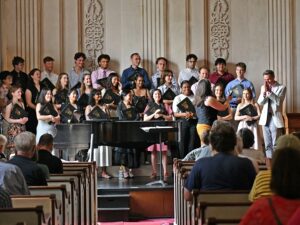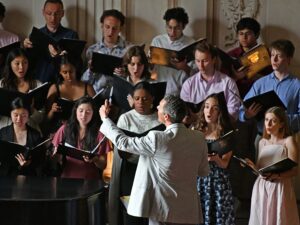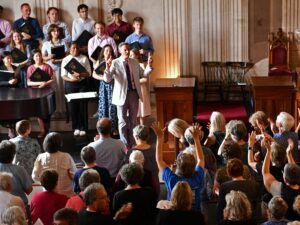PROVINCETOWN — The Trump administration’s increased pressure on student visa holders nationwide — and its all-out campaign against Harvard — came into view in Provincetown last week when the Harvard University Choir decided it was too risky to travel to Denmark and instead came to the Unitarian Universalist Meeting House on Commercial Street to sing.

The group’s appearance here had been announced only a few days before, but the church’s pews were filled for the one-hour performance on June 4. Audience members repeatedly clapped and cheered for the 26 students, many of whom are attending Harvard on F-visas for international students.
“As a community, Provincetown knows something about adversity, disappointment, and fear,” the Rev. Kate Wilkinson said as she introduced the choir and its director, Edward Elwyn Jones, who is from Wales. “But we also know, just as deeply, about the balm to the soul which is the solidarity of allies. We put out your story this week and look — half the town showed up!”
The Trump administration has made repeated moves to strip Harvard of its right to enroll international students, including a State Dept. review of all “foreign nationals who currently attend Harvard University” to see if they “should have their visas revoked.” Most of those moves have been held up by federal court injunctions.
But a series of other federal policy changes mean that student visa holders nationwide — including the thousands of international students who come to Cape Cod every year on J-1 Summer Work Travel visas — are now subject to intensive searches of their social media accounts when they arrive at U.S. airports.
Those airport device searches can lead to the immediate cancelation of a student’s visa — which is why international travel would have been risky for the Harvard students even though many of the Trump administration’s more direct moves have been blocked by courts.
The program of “expanded social media vetting” has been announced in incremental steps, including State Dept. cables on March 25 and May 27, and likely involves scanning multiple social media accounts with artificial-intelligence tools, according to an April 1 report in the New York Times.

“Students who have expressed sympathy for Palestinians during the war” in Gaza are especially at risk of having their F, M, or J visas canceled, according to that report.
As the Independent reported last week, two J-1 students who arrived on the Outer Cape in May said they waited for four hours at Logan Airport while their social media accounts were scanned for political content by U.S. immigration agents.
“I’m not that vocal about my political views and opinions, and I think that’s why I didn’t get into trouble,” one of the students told the Independent.
Being denied entry or re-entry to the U.S. is not the only new fear for international students: Tufts University graduate student Rumeysa Öztürk was arrested on the street in Somerville on March 25 after her F-visa was canceled for having co-authored an op-ed in the Tufts Daily the year before calling on the university to divest from Israel.
Öztürk was held for more than six weeks in a detention center in Louisiana before a federal judge ordered her release; the only evidence the government ever provided to support her arrest, according to the Boston Globe, was the op-ed.

Öztürk is one of at least 144 students at New England universities who have had their visas revoked, according to an April 11 tally by the Boston Globe. Öztürk is now suing to have her F-visa reinstated so she can continue her Ph.D. program at Tufts.
“Please keep singing,” Wilkinson said to the Harvard students as their concert began. “Keep being your full selves in the world. And keep looking out for each other. That’s how we’re all going to get through this.”
“There’s always a place for you in Provincetown,” Wilkinson added, as the students began a program of deeply spiritual music that left hardly a dry eye in the house.
A Choir Prays for Mercy
PROVINCETOWN — The choral pieces that were performed here by the Harvard University Choir on June 4 reflected the calamitous circumstances that led to the hastily arranged concert at the Unitarian Universalist Meeting House — and the group’s hope that its members who come from other countries will be able to continue their studies at the university in the face of the Trump administration’s punitive actions.
“Some really don’t know whether they’re going to be able to come back,” said conductor Edward Elwyn Jones. “The uncertainty is weighing on them. It’s just cruel to put the students through this.”
Many of the texts on the concert program were laments and prayers for mercy, with clear references to immigrants and refugees.
The concert began with “Let Us Cheer the Weary Traveler,” published in 1926, by Black composer R. Nathaniel Dett, who was born in Canada. “I’ll take my gospel trumpet,” the students sang, “and I’ll begin to blow. And if my Savior helps me, I’ll blow wherever I go.”
“Bring Me All Your Dreams” by Christopher H. Harris is the setting for a poem by Langston Hughes: “Bring me all your dreams/ You dreamers./ Bring me all your/ Heart melodies/ That I may wrap them/ In a blue cloud-cloth/ Away from the too rough fingers/ of the world.”
Moses Hogan’s “Hear My Prayer” included these lines: “Oh Lord, please hear my prayer./ Keep me safe within your arms./ … When my work on earth is done,/ And you come to take me home./ And to hear you say, ‘Well done!’/ Done with sin and sorrow./ Have mercy.”
Two of the pieces on the program were composed by Harvard graduates who are former members of the choir: “Hope and Love” by Carson Cooman, the setting for a poem by Jane Hirschfield, and “Set Me as a Seal,” a strikingly effective setting by Chung Hon Michael Chen of lines from the Song of Songs by King Solomon: “Set me as a seal upon your heart, as a seal upon your arm, for love is strong as death. Many waters cannot quench love; neither can the floods drown it.” The piece was composed for the wedding of two of Chen’s friends who met as members of the choir.
Other Biblical texts included “Create in Me a Clean Heart” from Psalm 51 in an affecting setting by the Black composer Euridice V. Osterman; Psalm 23 in a setting by Franz Schubert; and Giovanni da Palestrina’s 1593 setting of Psalm 91, “Scapulis suis” (“He shall cover you with his wings and you shall be safe under his feathers; his faithfulness shall be your shield and buckler”).
John Reese’s “Weeping Pilgrim” and Jonathan Dove’s “In Beauty May I Walk” drew sustained applause from listeners, who were also moved by Eleanor Daley’s “O Ye Who Taste That Love Is Sweet.”
The concert concluded with a heartfelt rendition of “Fair Harvard.” —Edward Miller
